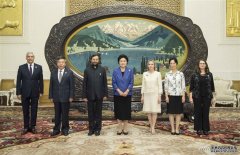Feature: Students thrive on Mandarin learning at Chicago's t
By Xinhua Writers Miao Zhuang, Xia Lin
CHICAGO, July 12 (Xinhua) -- Upper schoolers at the Walter Payton College Preparatory High School like to warm up their get-togethers with a rendition of Jasmine, the classic Chinese folk song that U.S. President Donald Trump's grand-daughter performed months ago during her visit to the Chinese Embassy in Washington.
"Chinese is one of the most widely used language in the world. So I think learning it is super important, because so many different people speak it," Helen, a Payton enrollee, told Xinhua in a recent interview.
Xu Qun, who came from China for her Mandarin-teaching job at Payton, has noticed for a long time the trendy choice among American children, saying that "I think a lot of children in the U.S. are very young when they start learning Chinese. Some parents think Chinese is so important that they hire a Chinese-speaking nanny to look after their children."
CHINESE LEARNING HIGHLY VALUED
Founded in 2000, Payton is now one of the best public high schools in Chicago.
As one of the nine "selective enrollment" high schools in the city, it has prided itself on highly qualified learners who value Chinese lessons a lot.
"I personally find learning other languages very interesting, which is why I have taken two different courses of them. So I think taking most of the languages, like Chinese especially, maybe help me with career in some type of foreign language," said Helen.
In 2006, Payton joined hands with East China Normal University in Shanghai to co-found the Confucius Institute, which was then the only one of its kind at overseas secondary school in the world.
Students met their challenges as well as found opportunities at the institute.
"The most difficult thing I find personally is the tone marks. I feel like I don't pronounce tone marks correctly at times," said Ernest Rionaula.
Kaylee Zilinger echoed the views, saying "probably because as an English speaker, how the tonality works doesn't really matter. It is just like to show the emotion. But in Mandarin it can change the entire meaning of a word. So I have to be careful when I speak the tones."
DIVERSE, BUT WITH A COMMON GOAL
At Payton, 30 to 40 percent of students are white, 20 percent Asian and 20 to 30 percent Latinos. Despite the diversity, their love for Mandarin is common and strong. Payton, as well as its Confucius Institute, is where their ambition blossoms over Chinese learning.
"I think I even want to have a double major with Mandarin being one of my majors, because I just love learning Mandarin so much. Then I think it will help me to communicate a lot when I become a doctor," said Zilinger.
"So it is really challenging for me, but I found it really fascinating for me to learn, like when you learn it you can also learn about the culture. Ms. Xu Qun teaches us a lot about the culture, which is also so different from English, which I found so interesting as well," Helen told Xinhua.
"I really became interested in traditional Chinese dance, maybe kind of want to join my school's Chinese traditional dance club and hopefully get better at dancing," added Zilinger.
STARTING YOUNG
Many Payton children started learning Chinese at a very young age, and later developed their interests in the oriental country.
"This little child I see, for example, at the age of five began to take Chinese class. For children like him, their pronunciation and their love of Chinese learning were implanted into their growing up from the beginning," said Xu.
Payton offers French, Spanish and Chinese as options for foreign language courses. Kids are supposed to have two out of the three.
"Many of the students have Chinese as their first choice. They had incentive to learn it," said Xu.
"I used to teach K-8 grade, a total of nine different levels of children. Every age I have observed. Some of the students have been learning with me for a long time. After nine years of learning, they usually go to college and continue to learn Chinese." she added.
LINGUISTIC SPECIALITY FUELS AMBITION
Strong linguistic ability helps improve their employment chance, especially in the era that China has burgeoned as an influential global market.
All Chinese learners at Payton are clear with such a reality, and do not want to miss a thing.
"In the future, I mean, it is one of the most rapidly growing languages in the business world. Like that, it is one of the most rapidly growing language as there is. It is coming up on English, like in the business world," said Rionaula.
"It is the fact that I can communicate with a billion more people, or the rich culture that comes with the language. But I've always wanted to learn Chinese and I am glad to have the opportunity to," said Zilinger.
"I haven't decided between the career of law and the career of teaching. So either way, there are many different cultures and many different people coming from many different places. If I can teach what I know, I mean, I can use it (Chinese) in my business, and I can use it in my setting," added Rionaula.















